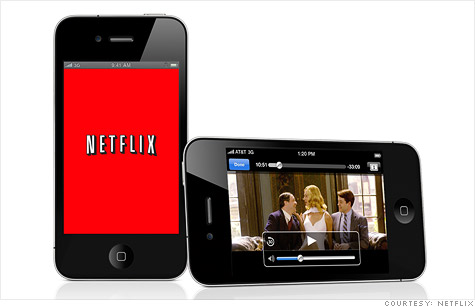Search News

NEW YORK (CNNMoney) -- Cable companies were ticked off when "cut the cord" became a rallying cry in 2009, with disgruntled consumers vowing to cancel their expensive TV plans in favor of cheaper options -- namely, Netflix.
But fast forward two years, and lots of Netflix rivals have popped up. They've each nabbed their own piece of the streaming video pie, fragmenting the market and making things complicated for consumers.
On Friday, a new player is jumping into the fray: Blockbuster, acquired out of bankruptcy in April by DISH (DISH, Fortune 500) Network, is holding a press event titled "A Stream Come True." The site is widely expected to unveil its own streaming service.
Blockbuster currently offers pay-per-view on-demand titles. With Dish Network's backing, it could make a powerful player in the flat-fee "all you can watch" streaming market that Netflix pioneered.
That means yet another choice for customers -- and no choice at all.
Want to stream current seasons of your favorite TV show? Hulu's probably your best bet. But wait! If it's a CBS show, you're out of luck -- Hulu doesn't have U.S. rights to those. Netflix (NFLX) has some, but rarely from recent years.
And what about Amazon (AMZN, Fortune 500) Instant Video, the company's experiment with free streaming for Prime subscribers who pay a yearly fee? You can snag some recent movies there, plus a smattering of TV shows from Showtime -- but none from HBO, which streams its content exclusively to its cable subscribers.
It's all very confusing. Which is, of course, is exactly how cable providers and studios want it.
If consumers can't get all the shows they want with a single cheap streaming option, they'll either have to juggle several subscriptions or stick with traditional TV.
"The studios' business philosophy is to work with multiple outlets, don't let any single one gain strength, and carve up the space," says Will Richmond, founder of consulting firm Broadband Directions.
"That's how Hollywood does business," he adds. "It's in their interest for things to remain confusing, and that's how it will be for a long time to come."
Studios love the infighting among streaming services and cable providers, because they're holding the power cards as the owners of the suddenly very valuable content.
If Netflix and its rivals get into bidding wars, the price of that content will keep climbing higher. In fact, one analyst predicts that Netflix's streaming content licensing costs will rise from $180 million in 2010 to a whopping $1.98 billion in 2012.
Meanwhile, consumers are the ones caught in the crossfire. Movies keep disappearing from their Netflix queues as streaming rights to them come and go, and it's a chore to figure out which services offer their favorite shows.
Is a rebellion looming? A decade ago, when listeners got fed up with the price of CDs and the hassles of buying legal music online, they turned en masse to Napster and other illegal file-sharing services. At least that way, they got a one-stop shop.
A legal fusillade from the record studios put Napster out of business, but the piracy wave really died down only when someone offered a cheap, easy solution: Apple's (AAPL, Fortune 500) iTunes. At 99 cents a track, it illustrated that consumers are willing to pay for digital content when the price tag is low and access is easy.
Netflix's turmoil has an awful lot of its customers muttering a word that should terrify the studios: BitTorrent.
"The illegal path is not about the cost; it is about actually being able to get all the content you want from a single source," CNNMoney reader Nathan Weyer commented on a recent Netflix story.
"This 'we have X content, but if you want Y you need to go to another service' ... drives consumers mad," Weyer added. "Sufficiently tech savvy consumers will just drop the whole mess and go the less legal route because the legal one is broken."
But making the legal method more attractive for streaming video isn't going to be as easy as it was for music, says Richmond, the Broadband Directions founder.
"You'll pay a small price for a song you fall in love with and listen to over and over again," Richmond says. "People don't generally approach a TV episode and say, 'I want to own that.'"
An all-you-can-eat, monthly subscription model for video remains the more attractive option -- and a big catalog is the ideal. But as the ongoing Netflix fracas illustrates, a simple solution seems a long way off. ![]()